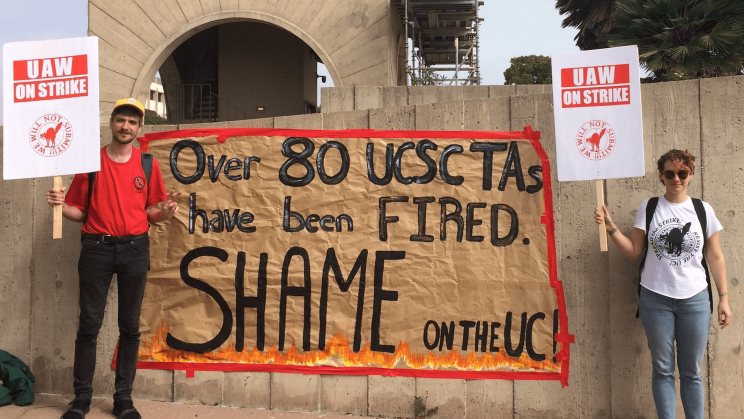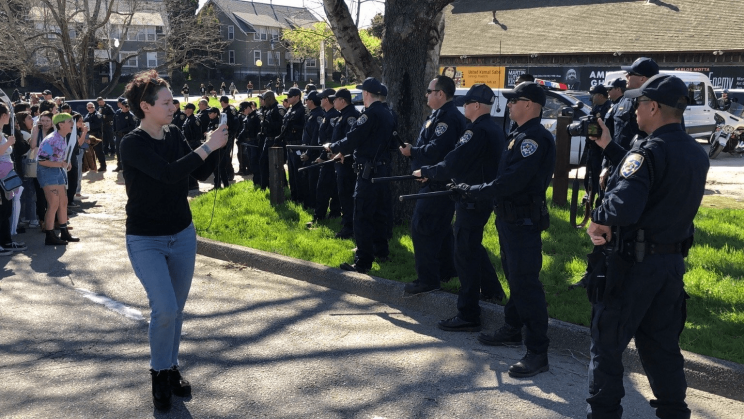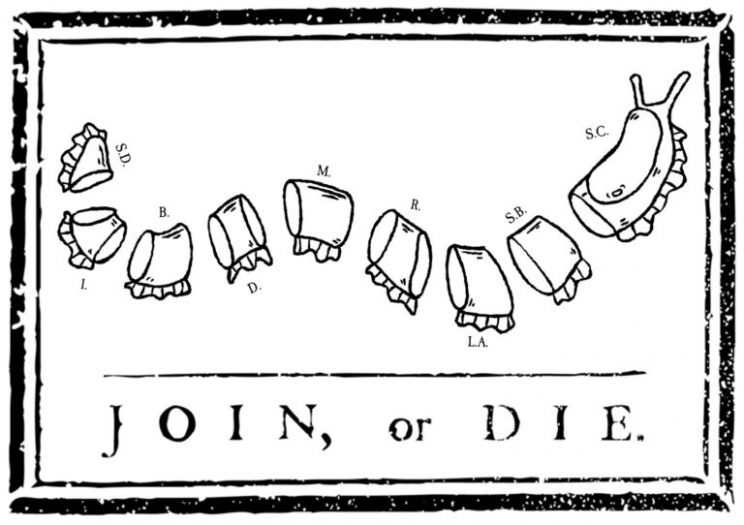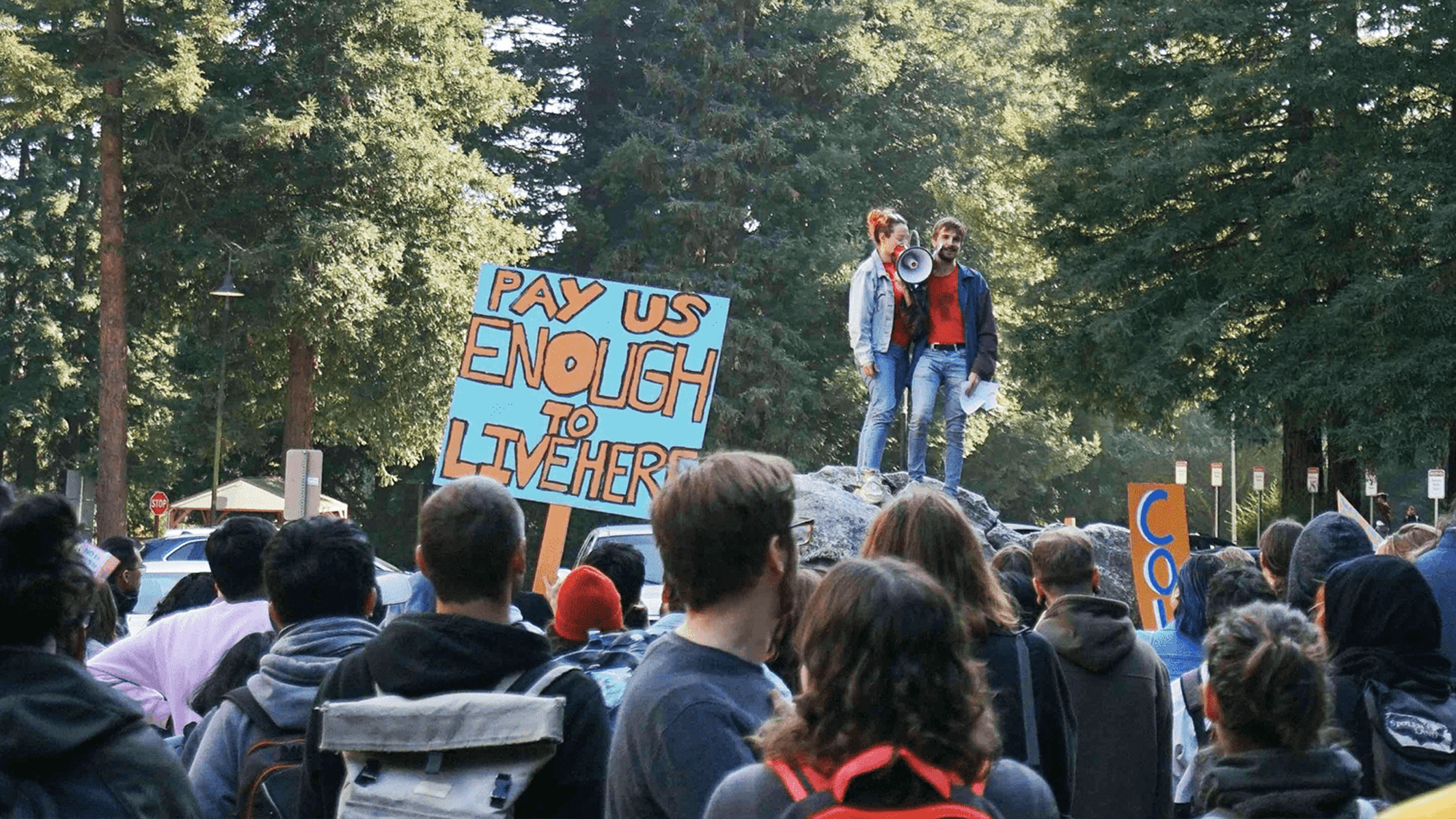“Everyone Deserves A Cost-Of-Living Adjustment”: Interview with UCSC Striker Yulia Gilich
Santa Cruz, CA – Graduate student teaching assistants (TAs) at the University of California in Santa Cruz (UCSC) are fighting for a livable wage. A year of unsuccessful attempts to encourage their employer to re-negotiate a fairer contract, including a cost-of-living adjustment (COLA) to their pay, has escalated into a full labor strike. In turn, dozens of workers have been fired by the university in retaliation for the Pay Us More UCSC campaign.

In 2018, an international housing affordability survey revealed that Santa Cruz is the fourth-most expensive city to live in on the planet. A further study, in 2019 by the Bureau of Economic Analysis, determined that Santa Cruz is the third-most expensive city in the United States.
All 10 campuses within the University of California (UC) pay their graduate student TAs the same wages regardless of the cost of living in each city. Wages have not kept pace with the cost of living in Santa Cruz, creating a desperate situation for workers who must choose between rent payments and other basic needs such as buying food or doctor visits.
Unicorn Riot interviewed Yulia Gilich, one of the organizers of the wildcat strike and a fourth-year Ph.D candidate at UCSC. They told us about the “digital picket” that continues despite UCSC shutting down the campus to mitigate the spread of COVID–19, and added that they hope to see the strike spread because “everyone deserves a COLA, and everyone deserves a dignified life.”
Listen below: (click here for the full transcript)
UC grad student TAs are all part of the same bargaining unit within UAW 2865. In 2018, the labor union signed a new contract on behalf of UC grad student workers which specified that workers are not permitted to strike. Though the contract guaranteed that all TAs across the UC system were guaranteed a 3% annual wage increase, in Santa Cruz the cost of rent have increases about 15% each year.
Gilich asserted that “the union undemocratically passed the contract.” Although technically the vote to ratify passed with a 58.6% majority of UC students across the state voting to accept it, over 82% of UCSC respondents voted against it. Two other UC campuses voted against: San Diego and San Francisco, both of which appear on lists of most-expensive cities in the United States, making UC students who live there more rent-burdened than students in other UC cities.
“The cost of rent and cost of living are exorbitant. So even in 2018 we knew that this contract was not gonna serve us, we’re not gonna be able to survive on this.” — Yulia Gilich, UCSC strike organizer
For about a year afterwards, a group of organizers tried to overturn the contract and return to the bargaining table. When that effort failed, UC graduate students began to put together a Santa Cruz-specific campaign for a cost-of-living adjustment (COLA).
TAs are demanding a minimum monthly raise of $1,412 to augment their monthly wages of $2,100; most UC graduate students are only paid nine out of twelve months per year due to a summer break. The average rent in the UCSC neighborhood is over $2,500 per month.
“[TAs] at each and every UC campus are now considered rent-burdened, according to criteria laid out by the U.S. Department of Housing and Urban Development.” — UAW 2865 website
Though the COLA campaign has been popular among UCSC undergraduates and faculty in addition to graduate students, the university responded with threats of intimidation and sending riot police to the early days of the picket.

In a statement published February 19 to UC President Janet Napolitano, faculty called upon the university to”refrain from punitive action against graduate students during the strike and from retaliation against them once the strike has been concluded.”
According to Gilich, the university filed student conduct charges alleging they “deleted grades from a university-managed grade system.” The position of the TAs and the union is that grad students only have access to the grading system because of their status as workers, therefore “this should be handled through the union” rather than through the university’s student disciplinary system.
Nevertheless, the university proceeded with student conduct charges and alleged violations, affecting primarily workers who are people of color and undocumented students — groups who already experiencing precarious living conditions.
“So it’s not enough that they fired us as workers. To me it seems like they’re targeting people who are facing student conduct charges and they’re going to try to expel them.” — Yulia Gilich
The outpouring of support for the COLA campaign seemingly caused UAW 2865 to change its position on whether the university should have to wait to renegotiate their contract with the TAs. When Unicorn Riot reached out to the labor union for a statement on why they had reversed their position, we learned that their office in Alameda County, California has been closed until further notice due to the ongoing COVID–19 pandemic.
Two unfair labor practice charges have been filed by the union — the first in February for UC’s refusal to negotiate with the labor union (the TA’s legal representative), and the second less than a week later for UCSC’s retaliation against the striking workers.
Yulia expressed gratitude for the outpouring of support and community-building from other UAW union members nationwide, as well as from UCSC faculty and undergrads. In a video showcasing the responses of grad students and allies to the firings, one person remarked that the campus-wide shut-downs wouldn’t have been possible “if it wasn’t for the undergrads” who joined the picket line by the hundreds.
Gilich says they want to see organized struggle for a livable wage spread across the country — “I want to see other graduate student workers and other low-waged workers across the country and across the world come together and build their collective power and demand better.”

As workplaces and schools shutter around the country due to the ongoing COVID–19 pandemic, the precarious existence of working-class people in the United States becomes more apparent. In past months the #COLA4all labor strike has spread from UCSC to other UC campuses, and in the past two weeks rumors of an April 1 rent strike have been circulating.
Low-wage earners around the United States and elsewhere may be preparing to revolt en masse. Stay tuned for further coverage regarding the coming strikes.
Cover image courtesy of Stephen Louis Marino.

The full transcript from the audio interview is below.
Narrator: This is Jenn with Unicorn Riot. Since December of 2019 graduate student teaching assistants at the University of California Santa Cruz have been on strike — first withholding undergraduate grades, and now their teaching labor, from their employer UCSC.
Yulia Gilich: From the very beginning I’ve been active in organizing both at the University, at UCSC, and in town in Santa Cruz in general.
Narrator: That was Yulia, a fourth-year Ph.D candidate in film and digital media at UCSC. She agreed to speak with me about the conditions that sparked the strike.
Yulia: The same group of people, and a bunch of other organizers in town, organized a mutual aid campaign for a homeless encampment in Santa Cruz to support massive embattled houseless population in town. Because, with our cost of living and cost of rent, our houseless population continues to grow, and the town is not supporting them. The cost of rent and cost of living are exorbitant. So even in 2018 we knew that this contract is not gonna serve us, we’re not gonna be able to survive on this. Recognizing how untenable this financial situation is, this campaign that we started organizing that focused on on-campus housing became this one singular demand for COLA, for a cost-of-living adjustment, for all graduate students regardless of where they live, regardless of their citizenship status, regardless of their anything, for all graduate students. We all need to be paid more.
Narrator: Yulia told me that although 83% of voting members agreed the 2018 contract was unacceptable, the UAW undemocratically passed the contract through anyways and settled with the University. For about a year afterwards a group of organizers tried to overturn the contract and go back to the bargaining table. When the effort failed, UC graduate students began to put together a Santa Cruz-specific campaign for a cost-of-living adjustment to their rate of pay.
Yulia: So a wildcat strike means that a group of workers in contract strike without union leadership authorizing the strike. The way the strike was called for was in an email chain by a group of rank-and-file workers who weren’t active in the campaign, who were not active in the union, who were just in such a desperate situation that at some point they said “I think we should strike. I think it’s time to withhold our labor, and if we don’t get more money, we are not giving grades.” And so that’s one of the campaigns of the strike, ‘No COLA, No Grades,’ and COLA stands for cost-of-living adjustment. So people started calling for a strike, and that’s what we ended up doing.
Narrator: Twelve graduate students including Yulia ran for student-government positions last year. They all ran on the COLA-for-all platform, and they all won. Yulia detailed how the strike escalated, as well as how UCSC chose to respond — first threats of discipline, then by firing striking workers.
Yulia: So we started this strike with a grading strike; we withheld grades in December. And then when we were first threatened with discipline, as a response to the threat, we escalated our grading strike to a full teaching strike. So we withheld our teaching labor as well as the grades. The very first response that we received after we went on strike was threat of discipline. Then we received written warnings, then about 80 people were terminated from their spring employment, which for them — well, for us, means loss of health insurance, and also loss of tuition waiver. The administration is trying to suppress the strike and break the strike rather than resolve the issue.
Narrator: Graduate students like Yulia conduct research at UCSC. She presents at conferences and publishes her findings. It’s clear she’s affiliated with the University and her work is an asset to UCSC. Yulia explained that the University of California waives the quarterly tuition for its graduate students, so long as they are employed by the University. UCSC now expects their grad student ex-workers to pay back tuition costs that had been previously waived because of their employee status. They’ve also lost access to their health care. On top of that, there’s another hurdle entirely for international students like Yulia.
Yulia: Not being able to pay tuition means that our student status may be jeopardized. And as long as I’m on a student visa, that may mean that I would get deported. If I fail to remain a student I can’t stay in the country. So this extra financial burden that is put on us by termination, for a lot of people may mean deportation. The majority of people who received student conduct summonses and charges are people of color, are undocumented students, are people from marginalized groups who already experience precarity that brought us to striking in the first place. So the university is targeting and doubling down on those who they promised to support, on those who they recruited saying ‘We value diversity and we will take care of you.’
Narrator: The labor union had originally insisted the T.A.s had to wait two years to re-negotiate their contract. The success of the strike has since pushed the labor union to adopt the COLA framework and demand the University returns to the bargaining table, a reversal of its previous position. On the nineteenth of February over 80% of UCSC faculty senate voted in support of higher wages for grads. I asked Yulia about the impact of this vote, and what other support strikers have seen from UCSC students and faculty.
Yulia: We had a physical picket line at the base of campus, at the base of campus sort of at the entrance to the university. Most of the time we were outnumbered by our students. Undergrads were at the picket every day by hundreds. It was really incredible, and they — this movement would not have been possible without them and without their support. Whenever we needed to rally or march or shut campus down, like block the roads with our bodies, undergrads were there; they were in the frontlines. We have seen faculty support at the picket every single day. On day 1 faculty marched down with banners, with signs and posters that said ‘Faculty for COLA ,we love and support you.’ They marched to join the picket in full academic regalia, and they were with us, participating in direct action, chanting and picketing. And that was just incredible to see. And then a few days later we had a very intense stand-off with the cops. UCSC deployed police from out-of-town and out-of-county, and at some point over 100 police officers in riot gear were at a stand-off with unarmed students engaged in civil disobedience and direct action. And faculty were so enraged by this heavy police response that they put their bodies literally between the students and the police. We had a line of faculty who protected us with their bodies. So that was such a powerful moment and we’re so grateful for not just solidarity but faculty’s physical presence at the picket and their physical, like, defense of us.
Narrator: That physical picket line ended earlier this month, but not because the strike is over. UCSC, along with other universities across the country, has shut down their campus to protect students, teaching staff, and other University employees from the spread of COVID–19, the highly infectious coronavirus. I asked Yulia how the sudden shutdown of UCSC campus has impacted the organizing strategy of the strikers, and what T.A.s are doing to get more creative now that the physical picket has ended.
Yulia: You know, I think the interesting part of the strike is that it began with a e-mail. I don’t think it will end with a email. But um, yeah, digital space has been really crucial for organizing this campaign and this strike. So we do, we really built robust digital infrastructure that I think is gonna be, maybe become even more nuanced and detailed. I imagine a lot of collective writing. I imagine a lot of meme-making, meetings over Zoom and Skype. I think we may work on our social media more and the website. But yeah, actually memes and emails have been really effective in engaging undergrads and engaging the broader community, and communicating with faculty as well. So, yeah, we actually went on Twitter and started soliciting COLA memes for a new meme gallery.
Narrator: Yulia said that Santa Cruz is one of the most expensive cities to live in across the country. I asked her what the University needed to do to end the labor strike.
Yulia: I think the university needs to come to the table and bargain. We want this to end. We don’t wanna strike for the sake of striking. We want to return to work! We want to teach our students, we want to do our research. But we also want to survive. No one is striking because we want a lavish life. We want to be able to afford to live where we work. That’s what an employer has to provide to its workers. I think it only makes sense that we at least need to be paid enough to live where we work, but right now we can’t afford basic needs. We can’t afford shelter and food. A lot of people skip meals. A lot of people are housing-insecure. A lot of people forego medical procedures because they can’t afford to go see a doctor. Other campuses who joined this strike very quickly also bear the brunt of an exorbitant cost of living. And every other UC campus has a COLA campaign and they’re organizing in solidarity, but also for their own COLAs.
Narrator: She mentioned that other nationwide members of UAW, United Auto Workers, have been vocal about their support. They’re written heartening letters, ordered pizzas for organizers’ meetings, and have generally recognized T.A.s’ struggle as their struggle.
Yulia: Everyone who lives paycheck from paycheck can absolutely relate to this struggle, whether or not they have to do with the university or academia. Having support of the auto workers has been something I did not originally expect, and I think it had a tremendous impact on everyone’s morale.
Narrator: As we were wrapping up, I asked Yulia if there was anything else she wanted our listeners to know.
Yulia: If a group of workers under contract comes to the table and tells the employer, ‘We have this agreement but it doesn’t work for us, and I think it’s time for us to re-negotiate,’ I think it strengthens collective bargaining. I think for us to be so organized to maintain this strike is a sign that it’s a very strong tactic, and the union is gonna be in a stronger position to bargain the next round, to bargain for a new contract when the time comes. One of the slogans of the campaign has been ‘Spread the Strike’ and so I kinda want to end on that. I want the strike to spread and I want to see other graduate student workers, and other low-wage workers across the country, and across the world, come together and build their collective power and demand better. We have seen COLA spreading, spreading across the country. I don’t know how secret that is, but we are gonna see other universities and other workers go on a COLA strike, from what I can tell, very very soon. And we’re hoping that all students and low-wage workers organize and demand better. Everyone deserves a COLA and everyone deserves a dignified life.
Narrator: Thanks for tuning in. If you enjoyed this content, remember to ‘like’ and share in your circles. If you’re able, consider making a donation to Unicorn Riot. All donations are tax-deductible, and help to support more content like this. The music used in this production is by Podington Bear, Luke Pigott, and Kosta T. This media is published under the non-commercial, share-alike, with attribution, 3.0 Creative Commons license.
Follow us on Twitter, Facebook, YouTube, Vimeo, Instagram, and Patreon.
Please consider a tax-deductible donation to help sustain our horizontally-organized, non-profit media organization:



